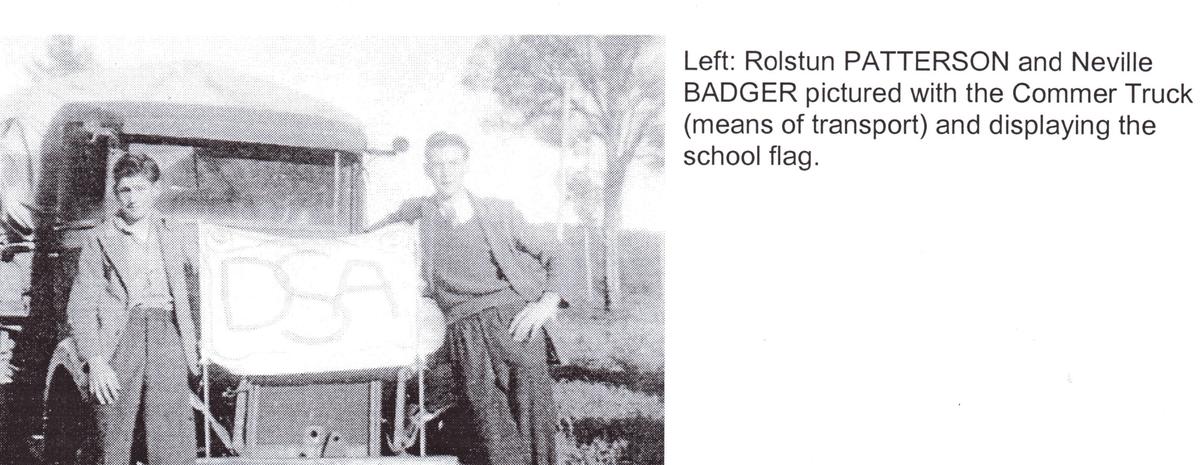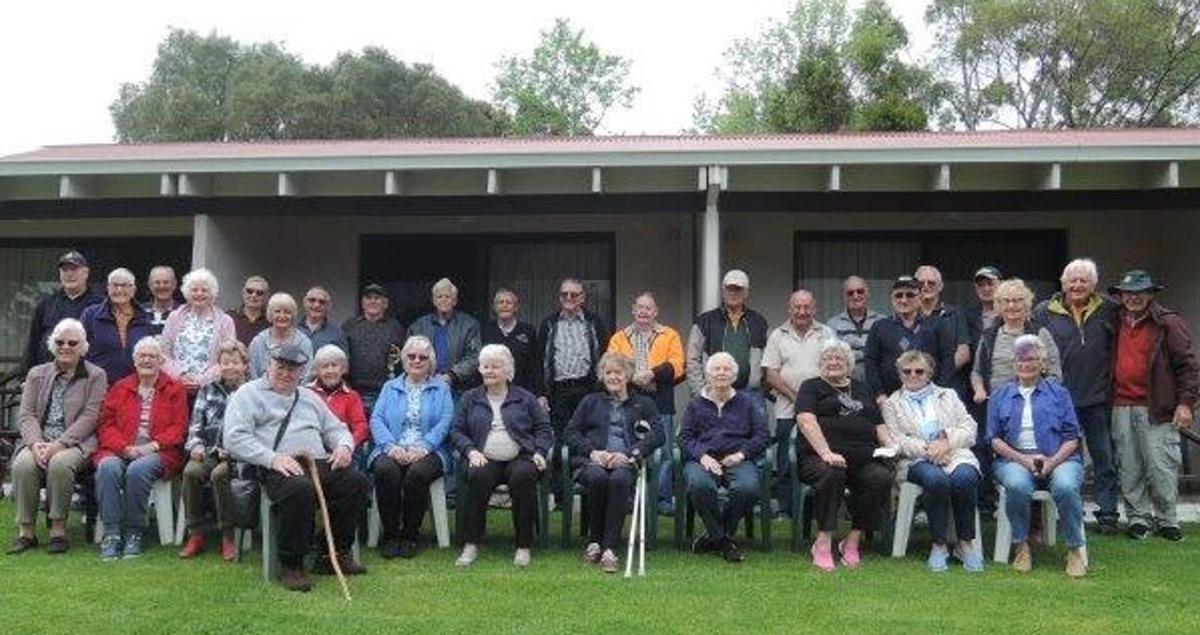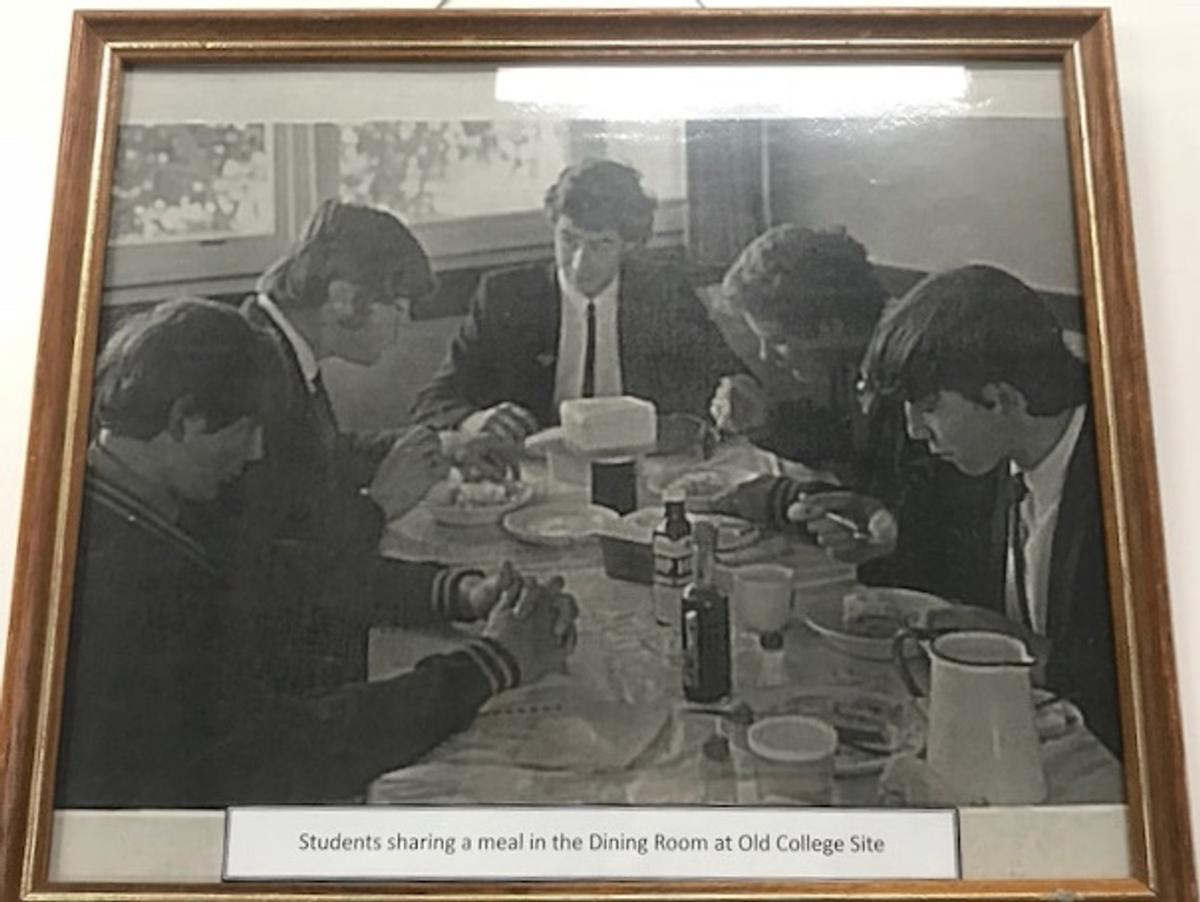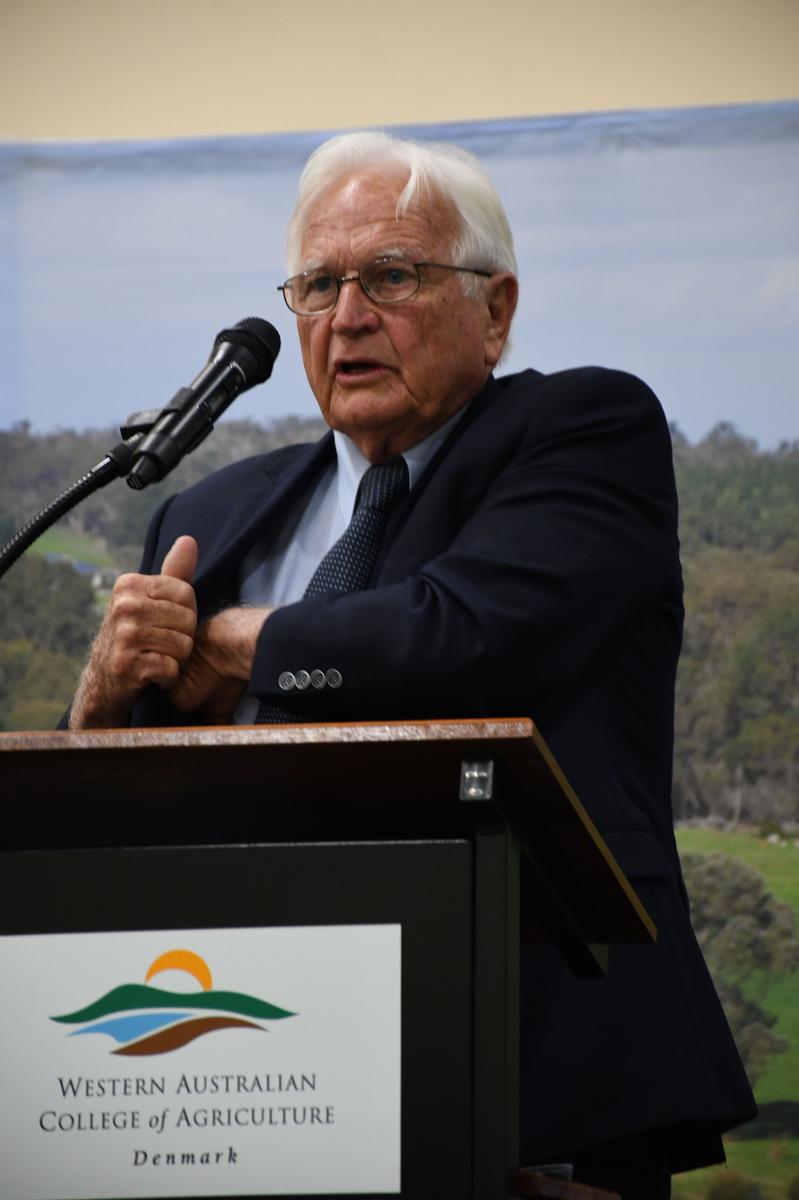Old Collegians Association
Photo: Department of Ag Research Station c.1951

Old Collegians Association
Photo: Department of Ag Research Station c.1951
As mentioned in a previous newsletter, I am pleased to now write about the life of Rolstun (Roly) Patterson, as provided by his wife, Muriel, and son, Dawson.
Roly was a student in 1944-1945 and achieved Diploma Honours. He received an Intermediate Certificate from the Royal Life Saving Society in 1945 as well as obtaining first prize at the Denmark Agricultural and Horticultural Society Victory Show for a riding bridle and for the best collection of saddlery articles. Roly was an active member of the Old Boys Association and provided stories and photographs for the 70 year book edited by Ross and Bev McGuinness. The family have donated a lot of memorabilia to the Denmark Historical Society from Roly’s collection.
Roly didn’t have a brother but boarding with the other boys at Ag school for two years provided him with support and skills (including sport), that helped him throughout his lifetime. Denmark School of Agriculture inspired him to recognise that if you are willing to work and use common sense, you can achieve your goals – exactly as the school motto said, "Strive to Achieve".
One of his early farms was ‘Lorrum Ridge’ north of Katanning. He and Muriel built a home with local stone which he had to cut and cart to the site. They later purchased a larger property – ‘Duds’ while still farming at Cartmeticup. Lorrum Ridge was then sold to purchase a 2,000 acre bush property in Wansborough. The effort required to bring (now) 4,200 acres into production was massive. Seeding with a 14 disc Chamberlain seeder and an AWD6 tractor required months of work with the hope of a small cash crop as well as establishing pasture for the sheep in the following season. Roly mostly worked on his own for the seeding and harvesting, with some help from family during school holidays. He hired help for scrub burning and lamb tailing. His goal was to increase production and therefore be financially secure with a brighter future for his family.


Their home could have been mistaken for a shearing shed – jarrah flooring for the living area and grating for the rest. Bedrooms were partitioned by wardrobes and curtains formed the doors. Toilet and shower were under the tank stand outside. In the 1960’s, banks would not loan money to build a home so they lived in the shed for four years – a not uncommon situation. He was not prepared to expand by taking high risks, preferring to work hard and wait for security to arrive a few years later. With dreams of a house, plans were made to build on the farm, but with high school not accessible for the children, they decided to build in Albany. Roly and son Warren commuted to the farm each week, returning home for the weekends. When seeding was on, the whole family would bunk in the farm shed, which was now a shearing shed as well as storage facility for super and grain.
With the introduction of the Pederick Root Rake, dealing with roots and suckers became easier especially in mallee country. In the 1980’s a Symonds Blade Plough and big tractors could turn a 25 year process into a one year operation. With the transition from horses to modern machinery, Roly saw the most radical changes in agriculture in a lifetime of any generation that has lived. Before his death, he had the immense pleasure of seeing four generations of his family working on and loving the land as he did. He passed away at 91 years of age, a life well lived and a wonderful story.
Kathleen Linto, wife of Cyril Linto, passed away on 29th September. The Old Collegians sent a bereavement card to Cyril extending our sympathy and condolences. Cyril was a past student and prefect and Dux 1947-1948.
Our group,1953-1956 held our annual reunion in Pemberton between 14th-17th October. We visited Bendotti avocado shed to witness the processing by fully automated sorting and packing. What an eye opener. Thanks go to our very own Murray Edwards for organising the visit. We also went on the Pemberton Tram and Donnelly River cruise. Saturday dinner was a mystery bus tour which took us to the Northcliffe Workers Club. The meal was magnificent. I met local chap John Armstrong at the bar and it turned out he was a student in 1977-1978. He related his school experience as well as a bit of life in Northcliffe.


On Sunday morning we had a farewell breakfast before we held a moving ceremony for Trevor McDonald to say goodbye to a great mate. His partner Barbara, her daughters and their partners joined us. They provided some Meekatharra dirt and plants along with photos as part of the event. Don Jones, (past student 1954-1955) student, has been in and out of hospital recently and unable to join the reunion. We send him our best wishes for his upcoming operation and recovery.
Now for something entirely different. Having asked for content for this article, I am pleased to say that I have received two stories. This first is from Jessie Proctor, nee Ridley.
After meeting my future husband Ron Proctor in 1957, I left my parent’s dairy farm in Brunswick and came to Denmark where I got a temporary job at the pub and in early 1958, a permanent job at the Ag School kitchen. Ron had been a student there ten years before. As I was to live out of town I needed transport so I bought an old BSA motorbike, learned to ride it and obtained a licence. Women motorbike riders were rare then, so it attracted a lot of attention. By the second year the bike was playing up and not very reliable, so I got a licence to ride Ron’s larger Triumph. Being too big to keep at the back door, I had to ride in from the west end of the dorms and park elsewhere. My day started at 7am and I got home about 7.30pm with time off in the arvo. I didn't like riding in winter as it was dark and the lights were not good and after the railway closed in 1957, heavy transport was put on the roads, which cracked them up. I only had one near miss with a roo and luckily it veered to the back of the bike and I didn’t come off, but it clawed my leg as it went. I arrived at work, tears and blood. Mrs Stevens patched me up from the First Aid tin and I got on with work. Jack Stevens was the kitchen help and his wife the cook. Vi Howesmith and myself were classed "waitress-maids". Casual kitchen staff came at weekends when health affected any permanent staff and a weekend cook, Barbara, came a few times. She decided to spoil the boys despite having a menu to follow. She made them jam tarts and got into trouble over it as it was regarded as being too expensive for the budget! Jack Stevens ordered all the food supplies and was always under pressure to stick to a tight budget, so food was pretty basic and there weren't many treats. It was typical country cooking which the boys would have been used to.
John Barton was Principal and Jack Moore, the Deputy. Mrs Clarice Silver Senior worked in the office. Frank Berridge was the gardener and Norm Pittick was handyman and cleaner of the building. He kept the dining room lovely. A Scottish man, Mac, was a handyman also. The manual arts building, near the main building is where teachers Bill Murphy, Gar Smith, Eric Caporn and Bert Nabbs taught. There were 40 boys at the school then. Ordinary school work was done in the classrooms in the main building and farm work at the Research Station where they worked long, hard hours. The boys sometimes went to private farms for outside work experience. No fancy machinery then, it was all hard yakka. The boys were, as most at that age, hungry and ready for meals and very little food was ever sent back to the kitchen. Perishable foods came in large boxes and bags either from local shops or straight from farms. Milk and eggs came from the Research Station. Sunday night served up thick soup, mostly pea, followed by bread and jam and fruit cake. Students had access to fresh fruit daily, which they took with them for between meals. Often breakfast was boiled eggs and cold toast...I cooked them scrambled eggs on toast for a better choice. Milk puddings were cheap for the budget – rice, tapioca (frogs eggs) and bread pudding made from leftover stale bread with sultanas and eggs, all served with stewed fruit... and at least once a week a good serve of stewed prunes. All cooking was done on the wood stove and ovens.
The boys had their own tin of "Kwik" (strawberry or chocolate), to stir into milk and tea was made in large enamel teapots for the boys to help themselves. The teachers had their own teapot and meals delivered to them. The boys were served at the kitchen counter and had to bring their dirty plates back, which provided time for a quick chat to the girls in the kitchen. We got to hear about escapes out of dorm windows to go down to Lovers Lane to the bridge to meet girls (and how they got caught -or didn’t) and what they did on the farm. There was the odd gripe, some of those kids just needed someone to talk to about their woes. At 19 and 23 years of age Vi and I were good listeners. In my second year, Mrs Stevens took ill and Vi and myself became cooks on alternate weeks with another kitchen maid for about 8 months till I left as a newly wed to help Ron on the farm.
The housemasters sometimes turned a deaf ear or blind eye to some of the tricks the boys got up to (as boys didn’t get caught often). On the last night of a particular school year, a few got out and turned a teacher’s car sideways in its little garage. By the time he found out. the lads were well on their way to catch the Albany train. Another prank was to con the new "melons" to the cemetery to be scared by older boys jumping up from behind the old tombstone in white sheets. Saturday night the boys would go to the pictures at the Lonsborough Theatre and then come Sunday it was church.
Over the years Ron and I went to all the reunions and Open Days which I still attend. I have great memories of the people I worked with and met. I also have great memories of the 40 boys I helped feed over two years and the quick chat to many of them over that time. Great days for me. Jess Proctor
David was School Captain, Dux and is a life member of the Old Collegians with his name firmly on the Honour Wall. He sent an email about his life and times...Hi Don, my name is David Colgate. I attended DAJHS (Agricultural Wing) in 1970-71. I thoroughly enjoy receiving the regular newsletter from the college, it is such a great pleasure to see the college constantly evolving into an education centre of excellence. You usually end your Old Collegians contribution by asking for news from past collegians. Now in my mid 60’s and retired, I thought I might send you something by way of a reflection on how my time at Denmark has influenced my life.
In 1969, I was in my third year of high school and not particularly academically inclined. Most of the students in my year at Albany Senior High School were deciding to either go onto their fifth year of high school or opt out for work or an apprenticeship. In those days it wasn’t untypical to have farming families as close relatives. That was the case for myself with one aunty and uncle (Joy & Ray/Bo Hick) on a dairy farm on Scotsdale Road in Denmark, with other families also in the wheatbelt and in Muchea. On school holidays we often stayed on farms with relatives.
Being “a town kid” I remember coming home one day in late 1969 and telling Mum and Dad that I wanted to be a farmer and how could that happen. They said I would have to go to Agricultural School if that was my wish. So, off I went to Denmark in 1970. I loved it! There were only a few of us “townies” at the school and in the main we were probably behind when it came to other kids who were from farms. Nevertheless, I can’t ever recall that we felt out of place with the farm kids who arguably knew more than us about machinery and stock. It was a happy time with turn about weeks on the farm and in school. Was it a tough school? On reflection, many of the things that happened wouldn’t be tolerated today. But my two year term at the school taught me many things. Not the least; people leadership, independence, tolerance and perseverance. In my final year I was proudly nominated as school captain and dux of my year.
At the end of my time at Denmark I was still in the same place as I was in when I entered the school - no farm to go home to and really too young to go into something like the Agricultural Department. In 1972, Muresk (WAIT) in Northam elected to open up an attendance opportunity for Agricultural School students. I elected to further my learning by going to Muresk for another two years. There were probably 8 of us at Muresk from either Harvey, Cunderdin, Northam or Denmark. Academically we struggled a bit against other kids who had completed 5 years of high school - but we all worked hard and graduated. At the end of Muresk, I was back in the same place again with no farm to go home to. However, a skill I learned at Denmark (under a hard but great metal work teacher called Bill Murphy) was welding, and I put this to good use to further my skills in engineering workshops when I was on leave from Muresk. I started my own small engineering workshop in 1974 which found me doing some work for The Shell Company of Australia. Eventually I was offered a full time position with Shell with the prospects of going into their Agricultural Chemicals business. However, I just liked engineering and the associated operational businesses too much and that became my career for the best part of the next 43 years.
I’ve worked all over Australia with Shell in many different management roles, with quite a few short term stints overseas. In my two last roles I was Operations Manager for Shell’s Bitumen business for WA/SA and finally HSSE Leadership Team Manager for Shell’s Lubricants business based in Queensland. As school captain at Denmark in 1971, I believe I self learnt fundamental people leadership skills and I’ve used those same first learned skills for the many management roles I had with Shell. Undoubtedly and without deliberation, I can truly say that my school experiences at Denmark gave me life skills that I still adhere to today.
In retirement, I’ve recently bought a small acreage south of Perth where I can at least play hobby farming. I will always hold my experiences at Denmark as one of my life’s highlights. Just a terrific school and a wonderful education that has undoubtedly enabled me to have a successful career outside of agriculture.


I believe this photo is in the new dining hall? I’m seated at the head of the table, prefects or second year students were next, then first year students at the bottom of the table. We were always hungry and you couldn’t imagine what we would load onto one piece of bread 😂 Regards, David Colgate.
I’m sure there are many more great stories out there so keep them coming.
The Association will be presenting the George Elliott Memorial Scholarship at Graduation Day on 19th November.
Remember to contact us to have your name added to the Honour Wall. Contacts are: Wendy Sutton 0419 048 694; Marjorie Morrison 9848 1633; Delys Ravenhill 0427 408 051 or myself 0428 526 398, email: hisylvi@bigpond.com.
Send your news to me at the above email address.
Until next time

